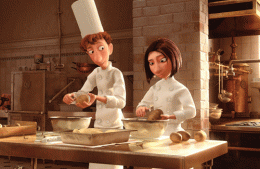How A Top Chef Made Peace With Pastry

In Fortune, chef April Bloomfield discusses how she got to be one of the most prominent cooks in New York, and one of the few women at the top of a male-dominated profession.
I did have an occasion where one of my chefs asked me if I wanted to do pastry. I’d been cooking for about two years and I already had this perception that pastry was a woman’s job, and I had my eye on the prize, and the prize was saute and grill. The hard work behind the hot stove — that’s where I felt challenged. So I passed on that opportunity to do pastry. I don’t know if he was asking me to do that because I was a woman, but in my mind I had that perception.
Did you ever end up trying pastry?
I did. It took me 7 years. It was in a small restaurant and everybody took their turn. I did pastry on my terms.
Very Peggy Olson of her. We should all do pastry on our terms.
Speaking of pastry, we can eat more of it, maybe, if we like. Religious scholar Alan Levinovitz’s new book called The Gluten Lie “suggests that arbitrary food plans [like gluten-free diets] are little more than a pricey way to ‘distinguish yourself from icky regular people who can’t see the truth.’” Or can’t afford to see the truth, more likely, because very often the more you pay attention to what you eat, the more it costs, it both money and time.
Science shows there is no salvation to be found, physically or spiritually, in abstaining from such foods [as wheat or sugar]. And yet, the fact that gluten-free foodstuffs is now a $10.5 billion dollar industry, and the juice cleanse business is north of $5 billion, suggests that a good many of us can’t help but indulge in a little magical thinking when it comes to our diets.
If that’s so, then fad diets and juice cleanses are no different from religious taboos around meals, like keeping kosher — except they’re a bit shallower and more individualistic. When folks choose to observe Biblical rules around food, they are aware of what they’re doing and acting within the context of a spiritual community. Also, the rules don’t change every few years when magazines need new copy.
Levinovitz also makes the European argument that eating should be about pleasure.
It’s also crucial to remember that eating — and living! — shouldn’t just be about physical health. As a nation, we’ve turned the dinner table into a pharmacy and life into a fitness routine. Food is a composite of nutrients; walks are exercise. To me that’s really sad. For many of us, aside from those with health conditions, neurotically pursuing perfect health destroys relationships: with food, with family and friends, with culture, and with yourself. Ironically, that can end up affecting your physical health.
Money quote, pun intended: “drinking $11 bottles of fresh-pressed juice isn’t going to remove anything, except for money from your bank account.”
Support The Billfold
The Billfold continues to exist thanks to support from our readers. Help us continue to do our work by making a monthly pledge on Patreon or a one-time-only contribution through PayPal.
Comments